Other People's Books
Well I suppose the holiday period is nearly over and it's time to think about getting back to work. I know you may be already there. It's a tricky time of year - what with the largely self imposed pressure to re-evaluate things and perhaps set new goals for a new year. My feeling is that if we're sure we know what we want and work towards it a little every day, we shouldn't need to overly beat ourselves up. Just get on with life and our goals will take care of themselves. Assuming you know what you want of course, which can, for some of us, take a lifetime to work out! Click on the link below to get today's New Year offer. THIS WEEK'S ARTICLE: Other People's Books Rob Parnell For a struggling writer, there's nothing worse than reading a great book. Finding an author who is patently superior to yourself can be a most humbling and depressin...

